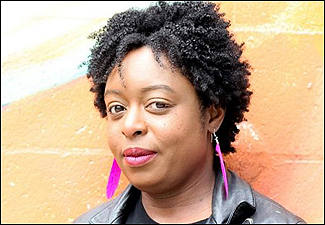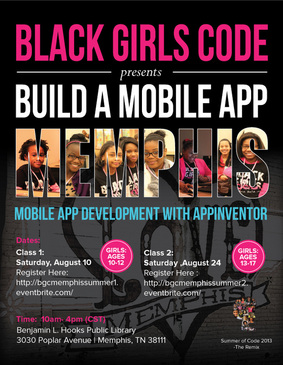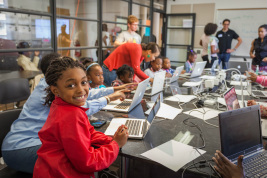READ: NSBE award pleases founder of Black Girls CODE
In the hopes that her daughter would take an interest in creating computer games rather than just playing them, Vanderbilt engineering alumna Kimberly Bryant found herself in April 2011 launching Black Girls CODE, a San Francisco nonprofit aimed at introducing young and preteen girls of color to computer programming and technology.

In June, she announced that her program had expanded into 10 major U.S. cities with a goal to reach 1 million girls by 2040.
“Girls, especially those of color, are summarily bypassed as far as being accepted as creative, and capable change agents in the tech industry,” said Bryant, who earned a bachelor’s degree in electrical engineering in 1989. She made the remark during a June presentation at a forum in New York City, adding that Black Girls Code was founded “to redefine” that narrative and to “make a radical, fundamental and lasting change in the technology industry.”
BGC’s mission is to teach a new generation of coders – girls aged 7 to 17 – about programming and technology and help them become future innovators. Primarily through summer camps or one-day workshops in cities such as Atlanta, Los Angeles, Chicago, Washington, D.C., and Bryant’s hometown of Memphis, the girls are introduced to HTML, CSS, basic Web structure and robotics.

Volunteers from LinkedIn, Apple and other tech companies help run the local chapters and the courses, and a grant from Google was key in BGC’s expansion. What began as a six-week course for a few girls at a community center in Bayview-Hunters Point, a predominately poor, economically disadvantaged San Francisco neighborhood, reportedly will reach more than 800 girls in 10 cities this summer (up from 700 and seven cities last year).
“Our goal is to become the Girl Scouts of technology,” Bryant said. “Kids are not afraid of technology, they embrace it. With the right opportunities they can be blazing new trails.”
In Bryant’s case, the trail she’s blazing is possible because she recognized those “right opportunities” at an early age. Her modest upbringing in Memphis meant she was not immersed in technology and had few role models. However, she enjoyed school and engaged herself in math and science, succeeding academically, she said, because she was lucky to grow up during a time when it was “cool to be smart.”
Stars aligned when a high school guidance counselor pushed her toward an engineering college at the same time Vanderbilt was heavily recruiting women into its STEM (science, technology, engineering, mathematics) programs.
“In the mid-Eighties there was a huge push to recruit women engineers,” recalled Bryant. “Now, I felt welcome and the university made an indelible impression on me. But, as a woman in the School of Engineering and a student of color, the number of students like me was extremely small.”
While learning a pair of coding languages (Fortran and Pascal) during freshman year classes of about 30 students, she was often the only female – and almost always the only African American female – which left her in a state of isolation, she said. Bryant remembered being excited by the prospects of a rewarding career after college, but with so few classmates looking like her she began to feel culturally isolated.

“As much as I enjoyed (the School of Engineering), it was a bit of a struggle back then… a rough four years,” Bryant said. “But there is much to be said for making any challenging journey with people of the same cultural background.”
Bryant acknowledges that things have changed since her Vanderbilt days, though African American women remain relatively absent when it comes to STEM professions. Even as she relocated to the Bay Area during California’s technology startup boom to take a job with Genentech, Inc., she saw that absence first-hand.
Genentech, a biotechnology corporation founded in 1976, is considered by some to be the launch site of the U.S. biotechnology industry. During her years as a biotech engineer and project manager, Bryant had many opportunities to attend networking events, conferences and workshops and often recognized that she was the only woman of color participating.
At home, she wanted to see her daughter take her love of computer games and challenge herself to learn new skills, so Bryant enrolled her in a few tech camps. When her daughter was just one of a few girls at camp – and the only student of color – she realized that her daughter was facing the same technological void she faced two decades earlier.
“There was not much diversity in the class. I thought that was a shame because it was an amazing opportunity, and I thought more kids should have that opportunity,” Bryant told the San Francisco Chronicle. “My focus shifted at that point. I felt a very strong drive to reach back into my community… and decided to create Black Girls Code as a vehicle to expose young women of color to the technical space and introduce them to computer programming and digital technology.”
There will be 1.4 million computer-related jobs in the United States by 2020, according to U.S. Labor Department estimates. Currently though, African American women make up three percent of the computer workforce, according to the National Center for Women and Information Technology. The center’s figures show that one percent of tech startups are founded by African American women.
Bryant found other statistics just as telling: that African Americans are nearly 30 percent more likely to own a smart phone than the average American, and 13 percent more likely to have a portable tablet product. In her New York City presentation she remarked that interest in computer technology is high among black girls, as evidenced by the large numbers at BGC workshops, yet “only three percent” of computer science degrees went to African American women in recent years.
“We realize that our kids don’t tend to have software engineers living down the street who look like them or have parents that are even in the tech industry,” Bryant told attendees. “Although we use a lot of technology and consume a lot of technology as people of color, we’re usually not the ones at the tables doing the creating of it.”
Bryant spends much of her time trying to raise funds for Black Girls CODE, and she works with educators to help redesign public school curriculum to include computer science classes. And she does all of this in the shadow of Silicon Valley, the nation’s tech utopia, which creates mixed emotions for her.
“It’s right in our backyard, less than an hour away (from Bayview-Hunters Point), but for some of our girls it’s a world away,” Bryant said. The income and education disparity gaps leave the girls with no real insight into biotechnology or computer programming and little exposure to STEM areas of study or the potential career paths they offer, she said. “It may be an arduous task, but we need to mine that area.”
A field trip to the IBM Research Facility, captured in “Black Girls CODE,” a small documentary about BGC, illustrated the importance of Silicon Valley contact. The girls display wide-eyed wonder to be sure, but also analytical thought and self-assurance too. Other visits help to grow Bryant’s vision and expand her program.
“My dream is we will be able to encourage girls to explore a career field that they may not have envisioned for themselves in the past and really open their eyes to the possibilities that they have as they grow and go to school,” she wrote on the BGC website.
NSBE award pleases founder of Black Girls CODE
Peer support helped Kimberly Bryant make it through four years at Vanderbilt University and she credited the National Society of Black Engineers with helping her take that first step toward a promising career. So she was quite happy to learn that Vanderbilt’s NSBE earned the Region III Small Chapter of the Year award at the 36th Annual National Convention in April.
Assistant Dean for Student Affairs Burgess Mitchell and 24 Vanderbilt students attended the convention in Toronto when the award was announced.
“We are extremely honored to receive this award,” said Erica Mills, Vanderbilt’s NSBE chapter president. “This year, it was truly a combined effort and we plan to continue to improve our programming over the next year.”
Convention activities included a technical professional conference, specialized exam training and academic competitions as well as speakers, workshops, panel discussions and executive roundtables.
Bryant, founder of Black Girls Code, a San Francisco nonprofit that introduces young girls of color to computer programming and technology, said her involvement in NSBE made the difference between earning her electrical engineering degree in 1989 and quitting school.
“Organizations like the National Society of Black Engineers were crucial to my success,” said Bryant, who remembered feeling “mentally unprepared and culturally isolated” as a Vanderbilt freshman before finding the on-campus group during Mosaic Weekend in 1986.
MOSAIC is Vanderbilt’s multicultural student recruitment program that hosts a spring weekend full of activities for newly admitted students. She had been bothered that none of her engineering professors were women, and none were African American.
“There were excellent professors; I was at a top-five engineering school, but I don’t think I had the concept of what that meant,” she said. “So (after discovering NSBE) I got into student activism, was president of my dorm, served on freshman council… that sort of thing. With NSBE, when the topic of student activism came up, I remember thinking ‘Yeah, I want to do that.’”